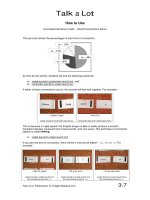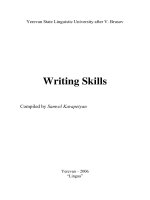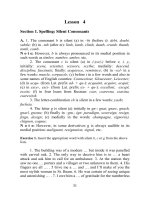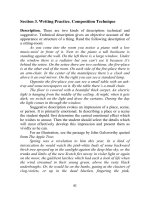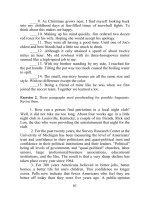Tài liệu Developing writting skills 1 part 5 docx
Bạn đang xem bản rút gọn của tài liệu. Xem và tải ngay bản đầy đủ của tài liệu tại đây (194.61 KB, 10 trang )
Section 3. Writing Practice. Composition Technique
Description. There are two kinds of description: technical and
suggestive. Technical description gives an objective account of the
appearance or structure of a thing. Read the following description of
a sitting-room:
As you come into the room you notice a piano with a low
music-stool in front of it. Next to the piano a tall bookcase is
standing against the wall. On the left there is a large window. Under
the window there is a radiator but you can’t see it because it’s
behind the settee. On the settee there are two cushions. the fire-place
is at the other end of the room. On each side of the fire-place there is
an arm-chair. In the center of the mantelpiece there’s a clock and
above it an oval mirror. On the right you can see a standard lamp.
Opposite the fire-place you can see a small table with an ash-
tray and some newspapers on it. By the table there’s a small chair.
The floor is covered with a beautiful thick carpet. An electric
light is hanging from the middle of the ceiling. At night, when it gets
dark, we switch on the light and draw the curtains. During the day
the light comes in through the window.
Suggestive description evokes an impression of a place, scene,
or person. It is primarily emotional. In describing a place or a scene
the student shpuld first determine the central emotional effect which
he wishes to arouse. Then the student should select the details which
will most effectively develop this impression and present them as
vividly as he can.
For an illustration, see the passage by John Galsworthy quoted
from The Apple Tree:
Spring was a revelation to him this year. In a kind of
intoxication he would watch the pink-white buds of some backward
birch tree sprayed up in the sunlight against the deep blue sky, or the
trunks and limbs of the new Scotch firs tawny in violet light or again
on the moor, the galebent larches which had such a look of life when
the wind streamed in their young green, above the rusty black
underboughs. Or, he would lie on the banks, gazing at the clusters of
clog-violets, or up in the dead blacken, fingering the pink,
41
transparent buds of the dewberry, while the cuckoos called and
yaffles laughed, or a lark, from very high dripped its beads of song.
Exercise 1. Write a description of the following. (First decide the
impression you wish to give, then make a list of the main things you intend
to mention to give the impression; arrange them in what you consider the
best for your purpose.)
a. A new hotel in your city;
b. The street you live in;
c. The University you study at;
d. A village you spent your holidays in;
Exercise 2.
Disaster Scene
.
For this exercise you will write a disaster scene that takes place
in a restaurant. Disaster doesn't necessarily mean explosions of the
Die Hard movie type. Write a disaster that's based on a personal/
psychological conflict. It might be easier to first think of your
characters and what they are doing at the restaurant. What is their
relationship to each other? What are they talking about? What type
of restaurant is it? What do they order? Use sensory details to make
the scene come alive. Remember to show, don't tell. Use dialogue if
possible. Have fun with it. Don't be afraid of sounding ridiculous or
unbelievable. Just have fun with it. Happy writing!
42
Lesson 5
Section 1.
Spelling.
A. Words with the Diagraph -gu-. The diagraph -gu- may occur
at the beginning or at the end of a word, and is pronounced as /g/.
Explain what the words given in the list mean and give their
derivatives if possible. Copy the list.
guarantee guile catalogue league
guard guilt colleague plague
guerilla guinea epilogue prologue
guess guise fatigue rogue
guest disguise the Hague vague
guide guitar intrigue vogue
In the middle of a word -gu- is pronounced as /gw/: to
distinguish /dis
'tiŋg
wi
ʃ
/, language /
'
l
æŋg
wi
ʤ
/, linguistics
/li
ŋ'g
wistiks/.
N o t e: argue /
'
a:
g
ju:/ - argument, tongue /t
ʌŋ
/.
Exercise 1. Fill in the blanks with the words from the above list. Translate
the sentences.
1. This man, to whom so much had been given, and from
whom, in consequence, so much was expected, this … of yours, has
betrayed the trust imposed on him. 2. I was … in the head from lying
in the hay. 3. A pause ensued, and suddenly I felt overcome by a
profound and hopeless … . 4. All the people who had low-grade jobs
were perpetually … for high-grade jobs, and all the people with high-
grade jobs were counter-… to stay where they were. 5. There was no
sincerity in the man, but there was a good deal of craft and … as well
as shrewdness. 6. They were here not a half-hour after you’d gone,
those …, and they tore my house apart to find you. 7. I saw that now
he wished with all his heart that he had held his … . 8. He saw that
she was going to hit him again, and lifted his arm to … his face. 9.
43
Then to prevent … I must decide for you all. 10. Mr. Smith tried to
talk to me about the picture, but he was incoherent, and I had to … at
what he meant. 11. He felt that they were all in … to call her away.
12. He did not want to be involved in this dangerous … .
Exercise 2. Replace the italicized words with those given in the list below.
Translate the sentences.
(argue, colleagues, vague, guardian, rogue, distinguished, languor
/
'
l
æŋgə
/, blackguard /
'
bl
æg
a:d/)
1. Mr. Campbell reasoned with his visitors about Edward
Brown. 2. “He is quite a scoundrel and besides an eminent one.” Mr.
Campbell finished and weariness appeared on his yellow face. 3.
One of his companions, Mr. Forester, said, “I suppose we should
know the opinion of Mr. Stone, as defender of Ted Brown’s interests.
4. His words were of the same uncertain quality. 5. Deceit and
hypocrisy are no credit to anybody.
B. Words with the Diagraph -qu-.
The diagraph -qu- is
pronounced in different ways, depending on its position in the word,
for example: quick /kw/, cheque /k/. A list of such words is given
below. Copy it and make sure that you know their pronunciation and
meaning. Give some derivatives.
quaint adequate squat
quality consequence squeak
quantity earthquake squeeze
quarrel eloquence squirrel
quartet equal tranquil
queen equip antique
queer equivalent brisque
quest (inquest) exquisite conquer
queue frequent grotesque
quiet inquire oblique
quit inquisitive physique
quite liquid picturesque
quiver require technique
44
quote sequence unique
acquaint square bouquet
acquire squash parquet
N o t e: liquor /
'
lik
ə
/, quay /ki:/
Exercise 3. Fill in the blanks with the words from the above list. Translate
the sentences.
1. Their … little Chinese faces were screwed up into strange
grimaces. 2. But though his words were repentant, there was
obviously something … about his behaviour. 3. Crowds of workers
were … up in front of the station. 4. There was the usual
gesticulating crowd on the … . 5. Its delicate branches against the
winter sky, its … leaves in summer had stood before my bedroom
window all my life. 6. She was still … by the many friends she had
made. 7. Her guest did not omit … after her husband’s health. 8. He
was different with; notwithstanding his shyness you felt in him an …
kindness. 9. That lady’s resolution had given way to terror the
moment she had … Manfred. 10. But though he said nothing of any
… , there was something in his personality, which prevented him
from being dull. 11. I was confused as a boy in his first passion, who
cannot speak because he has no … word. 12. It was really a crowd
and Marion was immediately … between two pretty women on a
sofa. 13. Edward’s … brought tears to our eyes. 14. And when he
forgot them and began to chatter, to wave his hands, he became at
once … . 15. The castles built by the Normans exist today as … ruins
in the grounds of large country houses. 16. He was very vain of his
… . 17. Though apparently being good friends, they often … . 18. A
small chamber about seven feet deep and four feet … lay open to us.
19. At the sound of his name John’s mouth … with rage and disgust.
20. She was still very young, but she was described to us as an
extraordinary person, who had … London in a few months.
Exercise 4. Replace the italicized words with those given in the list below.
Translate the sentences.
(to acquire, antiquity, to quieten, frequently, to quarrel,
exquisite, to require, to quit, quite)
45
